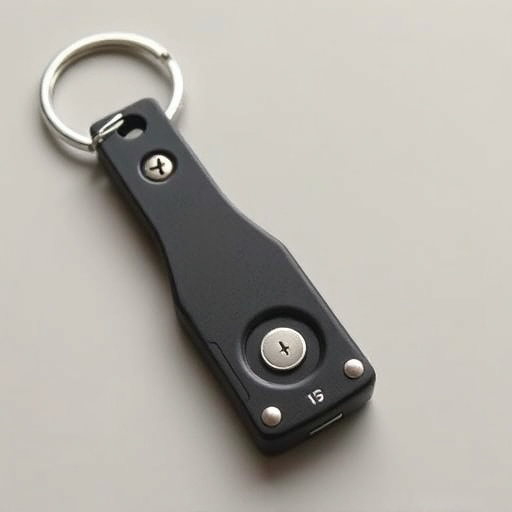Selecting the right metal alloys is key to crafting effective and durable self-defense keychains. Popular choices like stainless steel, high-quality aluminum, and D2 tool steel offer a combination of strength, corrosion resistance, and sharp edges. Durability is paramount, with rust and moisture resistance critical for longevity in harsh environments. Ergonomic designs and rigorous testing ensure precision and reliability in emergency situations, making these keychains practical and potent tools for personal safety.
In today’s world, self-defense tools that are both compact and effective are gaining popularity. One such innovative device is the self-defense keychain, a convenient and discreet option for personal safety. This article explores the critical aspects of crafting durable materials for keychain weapons, focusing on metal construction quality. We’ll delve into choosing the right alloys, ensuring rust resistance, practical design, and rigorous testing to guarantee optimal performance, making your keys more than just access tools.
- Choosing the Right Metal Alloys for Keychain Self-Defense
- The Importance of Rust and Corrosion Resistance
- Design Considerations for a Practical and Effective Weapon
- Testing and Quality Assurance for Optimal Performance
Choosing the Right Metal Alloys for Keychain Self-Defense
When crafting a keychain designed for self-defense, selecting the ideal metal alloys is paramount to ensuring both effectiveness and longevity. Durable materials for keychain weapons should offer excellent strength-to-weight ratio, resistance to corrosion, and sharp edges capable of inflicting harm in an emergency. Stainless steel, known for its rust prevention and durability, is a popular choice. Moreover, high-quality aluminum alloys provide lightweight yet robust options, ideal for discreet self-defense tools that won’t add significant bulk to your keys.
Alloys like D2 tool steel, renowned for its exceptional hardness and edge retention, offer superior cutting capabilities when sharpened properly. However, these metals may be heavier than stainless steel or aluminum. Choosing the right alloy depends on individual needs, with considerations such as intended use, personal preference, and budget playing a role in selecting durable materials for your keychain self-defense tool.
The Importance of Rust and Corrosion Resistance
In the realm of self-defense keychains, durability is paramount. When crafted from durable materials like high-quality metal, these compact weapons become reliable companions for personal safety. Rust and corrosion resistance are pivotal attributes that contribute to a keychain’s longevity. Exposure to moisture or harsh environments can lead to deterioration, compromising both functionality and aesthetics. Choosing keychains with robust anti-rust mechanisms ensures they remain in top condition over time, making them effective tools when needed most.
Durable materials for keychain weapons should not only be strong but also resistant to the elements. This resistance prevents damage caused by everyday wear and tear, ensuring each component remains intact and ready for use. High-quality metal construction, often augmented with protective coatings or finishes, guarantees a sturdy and dependable self-defense tool that can withstand rigorous use without succumbing to corrosion’s subtle yet damaging effects.
Design Considerations for a Practical and Effective Weapon
When designing a keychain weapon, one of the primary considerations is durability. To ensure effectiveness in self-defense scenarios, the construction must withstand significant force and impact without failing or bending. High-quality metal alloys like stainless steel are ideal choices for their strength, corrosion resistance, and ability to maintain sharp edges. These materials offer superior performance compared to lower-grade metals often found in cheaper alternatives.
Additionally, ergonomic design plays a crucial role. The keychain should fit comfortably in the hand, allowing users to grasp it instinctively during emergencies. Incorporating features like textured surfaces or non-slip grips enhances control and precision, enabling users to deliver powerful strikes accurately. Balancing these considerations ensures that the final product is both practical and effective for self-defense purposes.
Testing and Quality Assurance for Optimal Performance
When it comes to self-defense keychains, testing and quality assurance are paramount to ensuring optimal performance. The process involves rigorous evaluations to verify the keychain’s strength, durability, and reliability in various scenarios. Manufacturers often subject these metal constructs to extreme stress tests, including bending, twisting, and impact simulations, to mimic real-life use and identify potential weaknesses. This meticulous approach guarantees that the keychain can withstand unexpected forces without failure, offering users peace of mind during potentially dangerous situations.
The quality of materials plays a significant role in determining the overall effectiveness of these defensive tools. Opting for durable metals like stainless steel or high-grade aluminum ensures the keychain’s longevity and strength. These robust materials are resistant to corrosion and wear, ensuring the self-defense device remains functional over time. Additionally, precise craftsmanship guarantees smooth operation, allowing users to rely on their keychain as a reliable last-resort defense mechanism when needed.
When crafting a self-defense keychain, prioritizing durable materials like high-quality metals is essential. By understanding the benefits of specific alloys, their corrosion resistance, and thoughtful design, you can create an effective and reliable defense tool. Through rigorous testing and quality assurance, ensuring optimal performance becomes achievable, making your keychain a practical and trustworthy companion for personal safety. Choose wisely among the best durable materials for keychain weapons to empower yourself with peace of mind.
